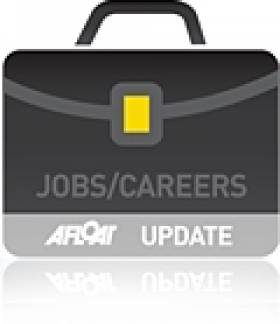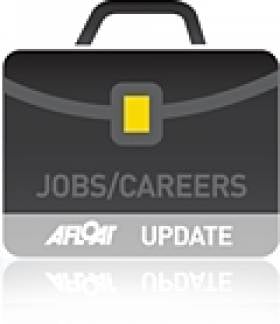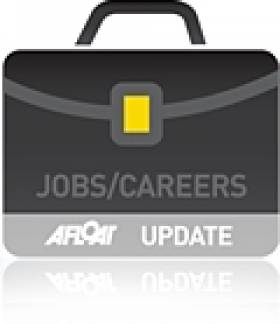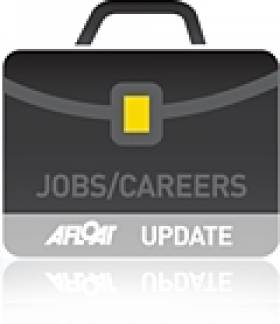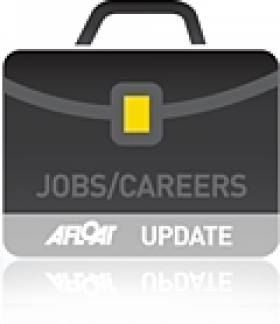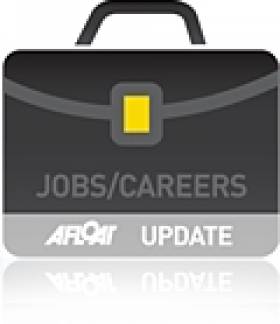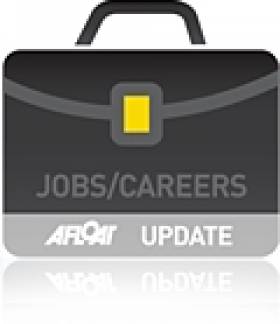Displaying items by tag: Job
BJ Marine Seek New Yacht Broker for Bangor Marina Office
Irish marine firm BJ Marine are recruiting a senior yacht broker to sell new and used boats at their well known and successful boat sales and service operation situated at Bangor Marina in Northern Ireland. BJ Marine represent market leading brands and our office network covers UK, Ireland and the Mediterranean.
BJ Marine Sales director James Kirwan says the successful applicant will be an 'energetic and motivated candidate' with a proven record in sales and a strong interest in boats. Computer skills are essential.
Brief Description of Requirements:
· Answering sales enquiries for new and used boats.
· Managing leads and prospects and to seek out new leads.
· Seek out and secure new brokerage listings.
· Participation in National and International Sales events.
· Communicate with fellow employees to generate sales all markets
· Report to management on activity progress.
· Work with existing boatyard staff to continue the success of the reputable yard
Location: Bangor, Northern Ireland
Salary/Rate: £TBD & Commission
To apply, please send a CV to [email protected]
Port of Cork Seeks Development Engineer
#portofcorkengineer – The Port of Cork has advertised for a Project and Development Engineer to mange its engineering services. The position requires a leader with a civil engineering degree and ten years post graduate experience. The role is advertised intoday's Irish Times newspaper. A copy of the advert is downloadable below.
World renowned St. Francis Yacht Club (StFYC) is seeking a full-time Race Manager, to run all aspects of the Club's Racing programme. The Club operates a year-round regatta schedule with all aspects of competitive sailing: kites, sailboards, dinghies, keelboats, match and team racing. International applicants are welcome.
For more information please visit www.stfyc.com or email resume to [email protected]
New Yachtmaster Course Launched by Galway Sailing School
#YACHTMASTER – In the wake of their recent Careers At Sea Expo, Galway sailing school Bow Waves are rolling out a full time Commercial Skipper course. Many people at the Careers At Sea Expo were interested in the pathways to careers, particularly the 200gt Commercial Skipper course. The course is unique in Ireland claim Bow Waves. It offers candidates the opportunity to gain a 200gt Commercial Skipper ticket in both sail and power. The dual certification gives students the chance to seek employment in a range marine jobs including, offshore support for the energy industry, superyacht skippering, bareboat charter, and commercial enterprise.
The course is open to people of all ability, including those who have no previous boating experience. The course is run in a module format which includes introductory courses to sailing and powerboating and follows through to Yachtmaster Offshore, with the option to qualify in Yachtmaster Ocean. The course also covers full STCW 95 safety training which is carried out in house at the centre in Galway. The course also allows for mile building in both sail and power to allow students to gain relevant experience in both areas.
In addition to a high level of training, the course also includes career guidance, with the Bow Waves team providing assistance in finding and applying for jobs.
The course is due to start on the 30th of January, and will run for 16 weeks. The course is fully credited by the MCA, ISA, RYA and Department of Transport. For full course details, as well as pricing, contact Barry on 091 560 560, or e-mail [email protected].
Royal Cork Yacht Club Seeks Cork Week Administrator
#JOBS – Royal Cork Yacht Club (RCYC) is recruiting an Administrator on a fixed term contract for its Cork Week 2012 regatta.
Cork Week, a major biennial event, the next hosting of which will take place from the 7th July 2012 - 13th July 2012.
Reporting to the Club Manager, RCYC says the role is an exciting opportunity for a person with proven administrative and organisational skills.
The person appointed will have a high level of computer literacy, a knowledge of website management and a familiarity with the world of sailing. The person must be able to demonstrate strong interpersonal abilities and use of initiative in dealing with Members, event competitors, sponsors, suppliers and the general public.Please send application and CV (by email only) to [email protected]
Closing Date for receipt of applications is 25th November, 2011
New Tall Ship Sailing Body Seeks Part-Time Manager
Sail Training Ireland, the new body established by Cosite an Asgard and the Irish Sailing Association is looking to appoint a part-time manager to help with the development of a business plan for the new sailing organisation that will be officially launched in Dublin Port in a fortnight.
The appointment is offered on a self-employed basis for an initial period until 31 December 2011 after which this new position in Irish sailing may be reviewed subject to funds available. The deadline for receipt of applications is in three weeks time.
The role is on a part time basis of the equivalent of 1.5 days per week. A degree of flexibility is required.
Remuneration will be at a rate of €200 pw.
The full text of the advert publisherd today reads:
STIYD ManagerSail Training Ireland is looking to appoint a part-time manager to help with the development of a business plan and the day to day running of the organisations affaires.
Background
Since the Department of Defence declared they no longer had an interest in sponsoring the continuation of the Asgard Sail Training Programme, and the subsequent decision of the Board of Asgard to wind up the Company, a working group supported by the ISA has been working to establish a National Sail training Association.
Sail Training Ireland for Youth Development Ltd. has been established as a limited company recognised by Sail Training International as the representative body for Sail Training activities in Ireland.
The aims and objectives of the organisation are:
- To promote the development and Education of young Men and Women on the Island of Ireland in and through the Sail Training Experience regardless of Nationality, Culture, Religion, Gender or Social Background
- To promote Sail Training in the Island of Ireland and Worldwide having special regard to the promotion of and support for Sail training Vessels and their Training programmes
- To promote and encourage knowledge of all subjects associated with the sea and matters Maritime
- To sponsor and support sea-going Trainees
- To co-operate and engage with other Sail Training Associations and Organisations on the Ireland of Ireland and Internationally
- To work with Sail Training International to establish a recurring STI endorsed Tall Ships Maritime Festival every 3/5 Years.
Membership/Affiliation
Membership if STI will be open to:
- Irish Sail Training Operators
Organisations that may already exist and/or may be set up in the future.
- Supporting Organisations
Organisations that do not operate a vessel, and who support the aims and objectives of STI.
That have an interest in the development of sail training in Ireland
- Personal Members
Who would like to support the development of sail training in Ireland.
Business & Development Plan
In order to ensure the sustainability of STI, it is important that a credible plan and feasibility study is developed. This will require professional/contracted resource - funds for which may be raised through the existing goodwill and support for Ireland’s Sail Training Programme.
Key Responsibilities
1. Administrating the STI Bursary Scheme for 2011
a. Managing the payment of bursaries
b. Liaising with bursary recipients
c. Collating Reports from recipients
2. Developing a set of Rules for the Association
a. Membership/affiliation Structures
b. Procedures at meetings
c. Election of the board etc
3. Managing the accounts of the Association
a. Keep records
b. Processing of payments/income
4. Charitable Status
a. Apply for charitable status
5. Management of the Website/ liaising with the webmaster
a. Maintenance and management of content
6. Board Meetings
a. Organise meetings (venues dates etc)
b. Send out agenda
c. Take minutes
7. Business & Development Plan
a. Source/research required information
b. Draft plan
8. Membership/Affiliation
a. Develop membership/affiliation application system
b. Develop membership benefits
c. Administrate applications
d. Maintain database
9. Funding
a. Identify sources of funding, revenue generating opportunities
10. PR and Media
a. Develop media plan for STI to raise the profile
11. Queries
a. Respond to queries relating to Sail Training in Ireland
Terms and Conditions
The appointment will be offered on a self-employed basis for an initial period until 31 December 2011after which the position may be reviewed subject to funds available.
The role is on a part time basis of the equivalent of 1.5 days per week. A degree of flexibility is required.
Remuneration will be at a rate of €200 pw.
Applications
A letter of application and CV should be sent by email to:
Harry Hermon, [email protected], titled: “STIYD Application”
Closing date for applications is: Friday 22nd April. It is anticipated interviews will be held on Thursday 5th May.
Looking for further reading on Tall Ships in Ireland? Click the links below:
Click this link to read all our Tall Ships Stories on one handy page
Previewing Ireland's Tall Ships 2011 Season
Can Ireland Get a New Tall Ship?
Dun Laoghaire Seeks New Harbour Master
Royal Cork Seek Operations Manager
The Royal Cork Yacht Club is recruiting an Operations Manager on a fixed term contract basis.
The Club offers a full range of sailing facilities, comprising a 200 berth marina, 40 moorings, extensive dinghy facilities, seven-day hospitality service and a full 12-month schedule of sailing activities.
Operating from Crosshaven, Co. Cork, the Royal Cork Yacht Club celebrates the 300th anniversary of its founding in 2020.
A notice on the club website this afternoon says;
"We are seeking to recruit a senior individual who will provide overall leadership and management for our operations team, with responsibility for overseeing the Club facilities, hospitality services and sailing activities. He or she will also be involved in the advancement of the Club's ongoing infrastructural development plan.
Reporting to the Executive Committee, this is an exciting opportunity for a person with proven commercial, hospitality and marketing skills.
The person appointed will have senior management experience, preferably in a marine, or leisure environment, and must be able to demonstrate strong interpersonal, organisational and leadership capacities."
Please send applications and CV (by e-mail only) to [email protected]


























